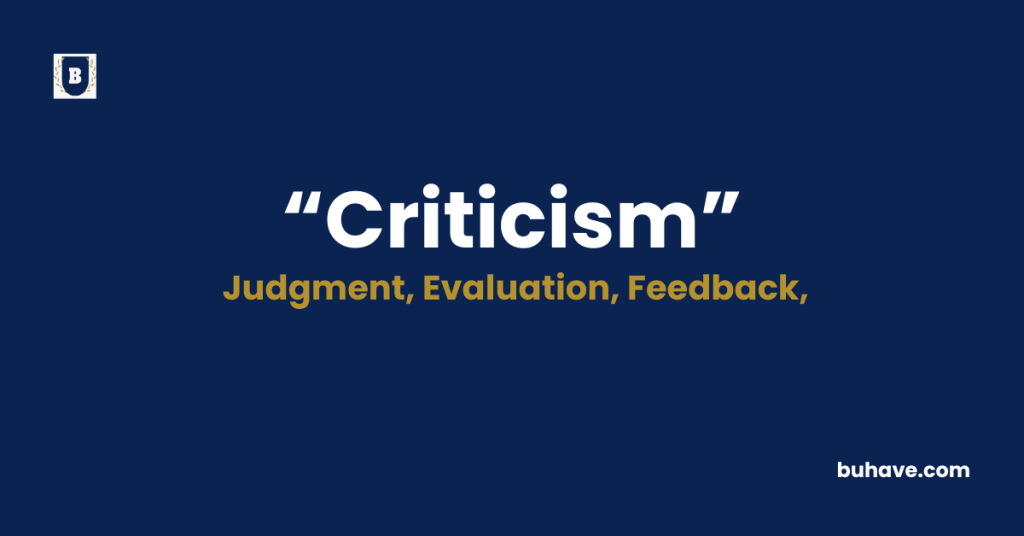The word Criticism (Noun) refers to the act of expressing disapproval or evaluating something’s faults or merits. In this guide, you’ll learn the full definition, synonyms, antonyms, etymology, and real-life examples of how to use Criticism correctly in sentences.
Criticism Explained in Depth
A complete and detailed guide to the word Criticism including meaning, definition, examples, etymology, synonyms, and antonyms.
Meanings of Criticism
Criticism means the expression of judgments about someone or something. It can highlight flaws, but it can also offer thoughtful evaluation, helping to improve quality or understanding.
Definition
Criticism refers to the practice of analyzing and evaluating a subject, often to identify problems or suggest improvements. While commonly associated with negative feedback, criticism may also be constructive, aiming to support growth or betterment. For example, a teacher’s criticism might point out errors in a student’s essay while also suggesting ways to improve. Criticism can occur in art, literature, politics, or daily communication. The term doesn’t always imply hostility. Instead, it often signals engagement or concern about a subject’s value, accuracy, or impact. Still, criticism can sometimes feel personal or harsh, especially when it’s not delivered with tact.
Therefore, how criticism is given and received can deeply affect relationships, learning, and growth. Ultimately, the purpose behind criticism determines whether it is helpful or harmful.
Etymology
The word “criticism” derives from the Greek word kritikē, meaning “the art of judgment,” which comes from kritikos, meaning “able to judge or discern.” It entered Latin as criticus, and later Old French as critique. By the early 17th century, the English word “criticism” emerged, initially linked to literary and artistic analysis. Over time, its use expanded to include any evaluative commentary. Originally, it was a specialized term used in scholarly circles, especially in philosophy and literature. But eventually, it became common in daily speech. Today, “criticism” is used across many areas—from book reviews and academic critique to social feedback and personal advice. The evolution of the term reflects society’s ongoing focus on evaluation, discernment, and improvement.
Example Sentences
- Her artwork received both praise and criticism from the judges.
- Constructive criticism helps people grow and refine their skills.
- The politician faced harsh criticism after the policy failure.
Criticism Synonyms
- Evaluation
- Review
- Feedback
- Assessment
- Judgment
- Commentary
- Opinion
- Appraisal
- Disapproval
- Analysis
Criticism Antonyms
- Praise
- Approval
- Compliment
- Endorsement
- Support
- Admiration
- Encouragement
- Acclaim
- Applause
- Flattery
FAQs about Criticism
Here’s a FAQ-style guide about the word “Criticism”
1. What does “criticism” mean?
It refers to expressing opinions, often about faults, but sometimes about strengths as well.
2. Is criticism always negative?
No. Constructive criticism is positive and meant to improve something.
3. How can criticism be helpful?
It provides feedback that can guide personal, professional, or creative development.
4. Can criticism damage confidence?
Yes, if delivered harshly. However, supportive tone makes it easier to accept and apply.
5. What is the difference between critique and criticism?
Critique often implies a detailed, balanced analysis, while criticism may focus more on flaws.

















